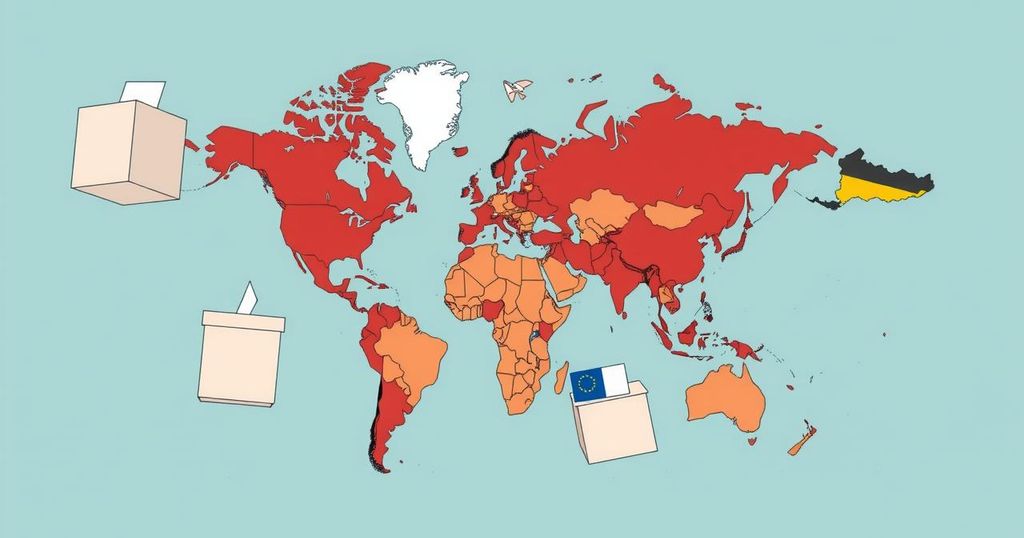In 2024, global voters demonstrated a clear demand for change, rejecting incumbents in various countries amid growing discontent over economic and political issues. From South Africa to the United States and Europe, traditional parties faced significant losses to emerging political factions. Notable electoral disruptions occurred alongside the rise of far-right movements and allegations of foreign interference, painting a complex picture of democratic resilience and fragility as nations prepare for a potentially contentious 2025.
As 2024 unfolded, the global political landscape became increasingly volatile as citizens expressed their dissatisfaction with incumbent governments. A staggering 70 countries, which together represent half of the world’s population, held elections, and in numerous instances, voters delivered a resounding message to their leaders: they had lost their trust. Economic turmoil, particularly due to the lingering effects of the COVID-19 pandemic and the ongoing ramifications of Russia’s invasion of Ukraine, drove voters in countries, including India, the United States, and across Europe, to seek alternatives to the existing power structures.
The repercussions of mass protests, election cancellations, and political upheaval reverberated worldwide. Cas Mudde, an esteemed political analyst, characterized the year as one of great advancement for far-right movements and considerable setbacks for incumbents. In nations such as South Africa, traditional parties experienced dramatic losses, exemplified by the African National Congress’s coalition with opposition groups after three decades of dominance. Elections in Senegal, Ghana, and Botswana signaled similar trends of change as long-serving governments were replaced by new political entities.
Political turmoil was evident not only in Africa but also in Asia, Europe, and the Americas. India witnessed a shocking turnaround in favor of the opposition, leading to Prime Minister Narendra Modi’s party losing its parliamentary majority. Similarly, the political environment in the United Kingdom shifted drastically, as voters ended a 14-year Conservative government in favor of the Labour Party. Countries like Japan also felt the impact of voter discontent, leading to a minority government following significant electoral losses.
The rise of authoritarianism was notable this year, with far-right populists making significant gains in elections within the European Union. Parties such as France’s National Rally and Austria’s Freedom Party successfully disrupted traditional power structures despite facing coalition challenges. In Pakistan and Indonesia, political dynasties remained relevant, fueling discontent while simultaneously being contested by emerging political leaders amid allegations of interference and election irregularities.
While statistics suggest overall support for democracy remains intact, a troubling decline in satisfaction levels regarding its practical implementation has become apparent. Voters are increasingly disappointed with how democracy is functioning in their nations. Seema Shah, from the International Institute for Democracy and Electoral Assistance, pointed out that while people support the idea of democracy, their experiences show a disconnection between their expectations and reality.
The year culminated in significant political shifts and instability, leaving numerous countries facing uncertainties that may overshadow the immediate future. As 2025 approaches, continued electoral challenges are anticipated, especially in nations like Germany and Canada, where incumbent governments face declining popularity and dissatisfaction fuelled by economic pressures. The cyclical nature of politics suggests that the search for effective governance will persist amid ongoing turbulence and unrest.
In 2024, global democracies faced heightened instability as citizens around the world responded to economic distress and political dissatisfaction with fervent electoral rebukes against incumbents. This phenomenon transpired across diverse nations, showcasing a remarkable trend where voters opted for change amid widespread concern regarding governance quality. Factors such as inflation, public health crises from the COVID-19 pandemic, and geopolitical tensions illustrated a shared global context influencing electoral outcomes. The implications of this ‘super year’ revealed underlying grievances towards traditional power structures, leading to shifts toward less conventional parties and movements, including an unsettling ascent of far-right entities. These dynamics underscored a fragile state in global democracy, where electoral integrity faced threats from disinformation and political meddling as revealed by reported interference in several elections.
The tumultuous events of 2024 underscore a pivotal moment in global politics, characterized by a notable rejection of incumbent governments across multiple countries driven by widespread dissatisfaction with prevailing conditions. From significant electoral upheavals in established democracies to concerning advances in authoritarian tendencies, the international community is presented with a landscape fraught with instability. As numerous nations grapple with declining public confidence in democratic structures, the year serves as a potent reminder of the fragility of governance and the imperative for effective leadership amidst growing public demand for accountability. Therefore, 2025 is poised to be another critical year as these global trends continue to unfold, with the potential for further transformative political shifts.
Original Source: www.clickondetroit.com






